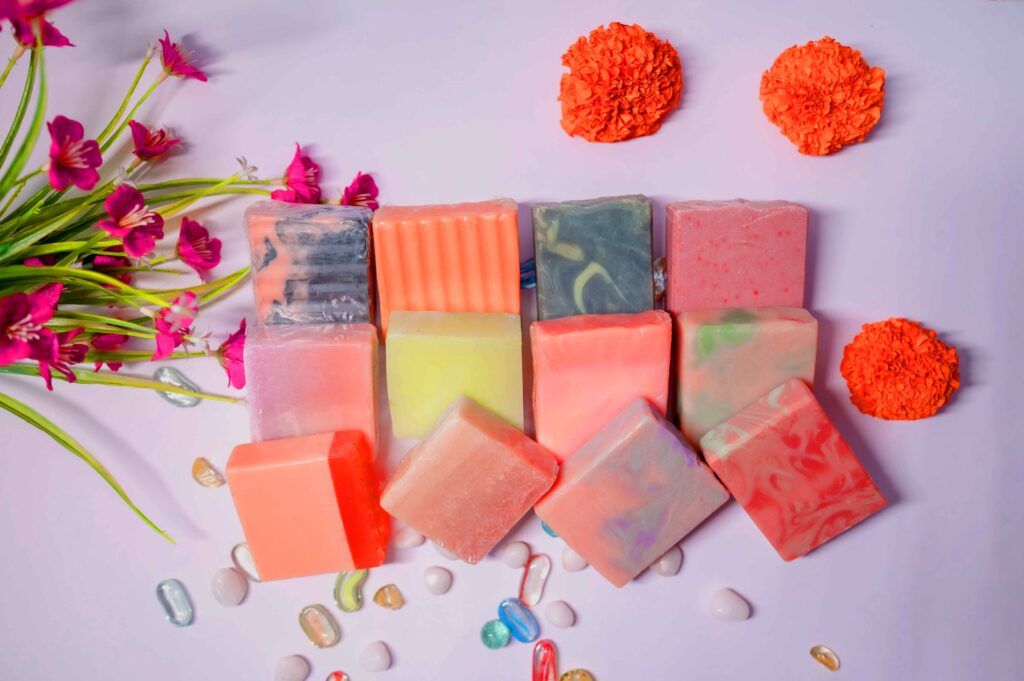Why Cold Process Soap Is Better Than Commercial Soap

Cold process soap and commercial soap differ in several key ways, including their ingredients, manufacturing processes, quality, and benefits. Here are the main differences between the two:
- Ingredients:
- Cold Process Soap: Cold process soap is typically made with natural ingredients, such as vegetable oils, essential oils, and botanical additives. Soap makers have control over the ingredients used and can create custom formulations to suit different skin types and preferences.
- Commercial Soap: Commercial soaps often contain a variety of synthetic chemicals, detergents, and additives. These ingredients may include harsh surfactants, synthetic fragrances, and preservatives. Commercial soap formulations are typically mass-produced and may prioritize cost-effectiveness over the use of natural ingredients.

- Glycerin Content:
- Cold Process Soap: Glycerin, a natural byproduct of the saponification process, is retained in cold process soap. Glycerin is a humectant that helps attract and retain moisture in the skin.
- Commercial Soap: Many commercial soap manufacturers remove glycerin from their products to use in other cosmetics, as it is a valuable ingredient. This can result in commercial soaps that are less moisturizing and more drying on the skin.
- Customization:
- Cold Process Soap: Soap makers can customize cold process soap recipes to create soaps with specific properties, such as moisturizing, exfoliating, or addressing skin issues like acne or eczema. This allows for a wide range of soap varieties tailored to individual preferences.
- Commercial Soap: Commercial soaps are typically one-size-fits-all products with limited customization options. They are designed to appeal to a broad consumer base rather than addressing specific skincare needs.
- Manufacturing Process:
- Cold Process Soap: Cold process soap is made by hand in small batches, allowing soap makers to pay attention to detail and create unique designs and scents. The process does not involve external heat; instead, it relies on the chemical reaction of saponification.
- Commercial Soap: Commercial soaps are mass-produced using a variety of methods, including hot process, melt and pour, and continuous soap manufacturing. These processes prioritize efficiency and consistency over the artisanal qualities of cold process soap.
- Environmental Impact:
-
- Cold Process Soap: Many cold process soap makers prioritize eco-friendly practices, using sustainable ingredients, avoiding excessive packaging, and producing less waste.
- Commercial Soap: The production of commercial soap on a large scale may have a larger environmental footprint due to the use of synthetic ingredients, energy-intensive processes, and excess packaging.
- Transparency:
- Cold Process Soap: Cold process soap makers often provide detailed ingredient lists, allowing consumers to make informed choices about the products they use on their skin.
- Commercial Soap: Commercial soap manufacturers may not always disclose all of their ingredients, and some may use proprietary fragrance blends without revealing their components.
- No Animal Testing: Many handmade soap makers are committed to cruelty-free practices and do not test their products on animals.
Overall, while both cold process soap and commercial soap have their place in the market, cold process soap is often favored by those seeking natural, customizable, and artisanal skincare products with potentially gentler and more nourishing qualities for the skin.
